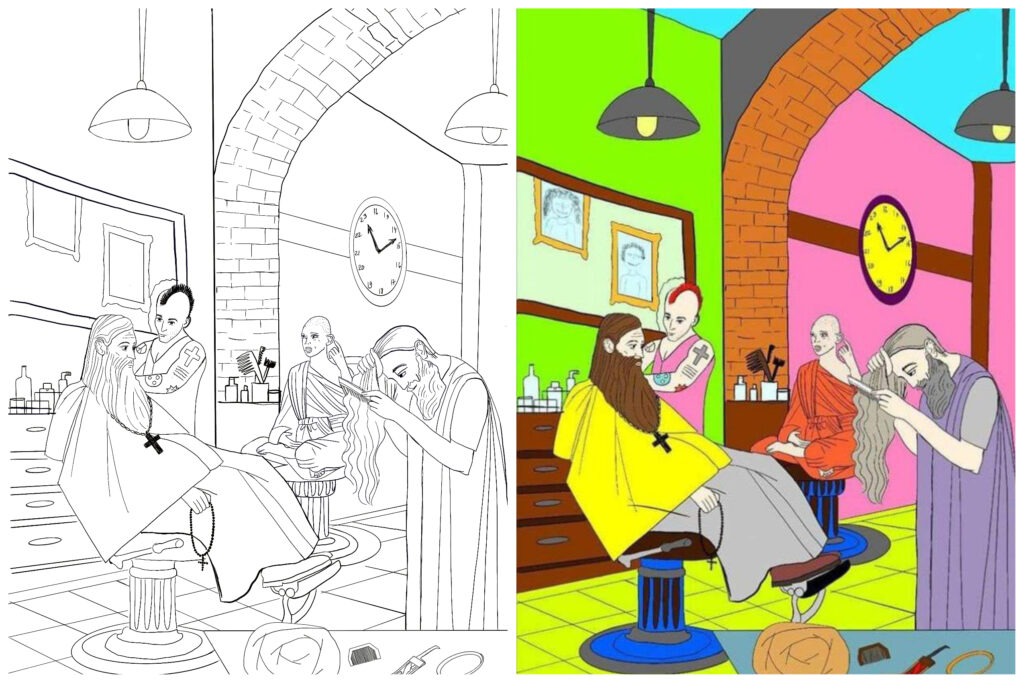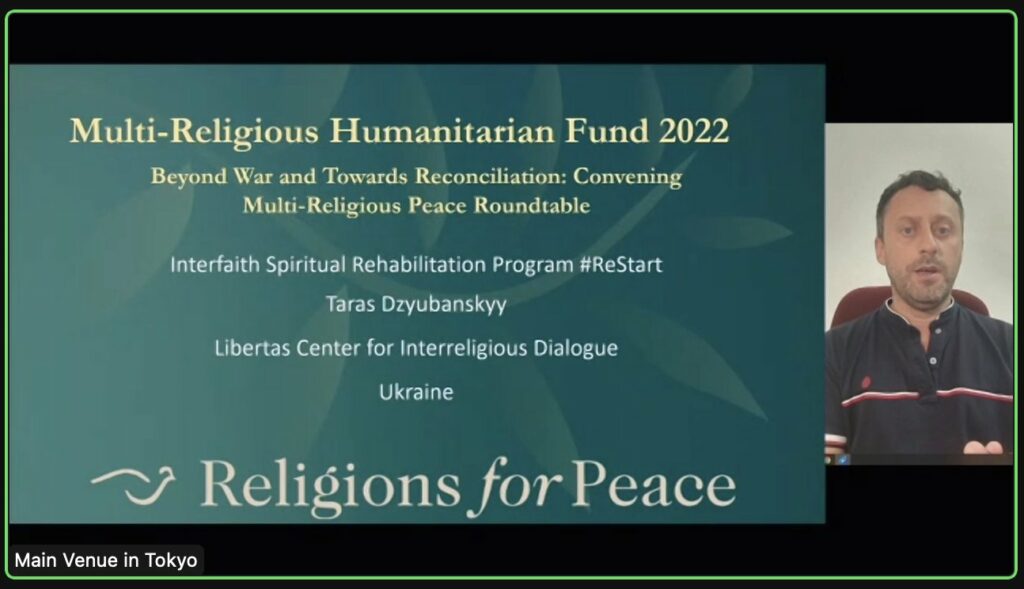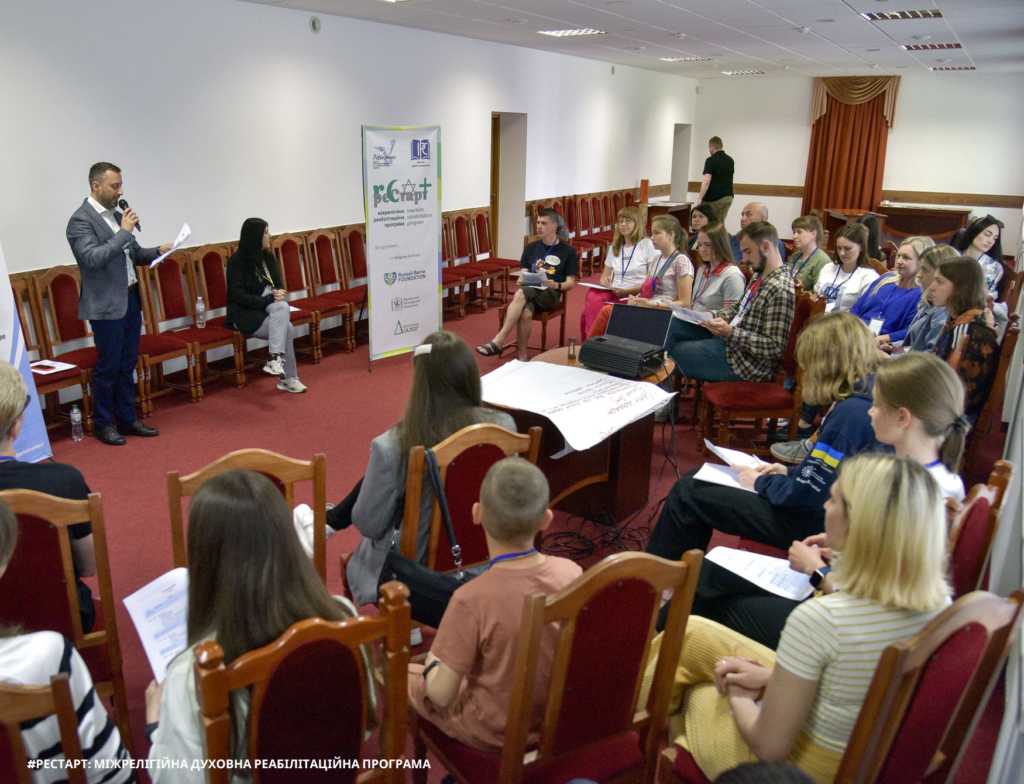Photo Credit: ReStart Ukraine
The Russian invasion of Ukraine has broken communities, forced millions from their homes, and taken the lives of thousands. With the support of grants from the JPII Center, Nataly Pavlik and Taras Dzyubanskyy have designed and implemented two fantastic projects to help promote interreligious literacy, dialogue, and peace in their home country of Ukraine.
JPII Leader Nataly Pavlik created and launched Interfaithing Humanity, an interfaith coloring book. During the Russell Berrie Fellows study trip to Israel in 2020, Nataly was inspired by a visit to the Basilica of the Annunciation in Nazareth, where there is a gallery of diverse depictions of the Holy Mother of God in various cultures around the world. Nataly discusses the impact of this encounter: “At that moment, it became clear that to see the profound beauty of diversity, one should first educate one’s own eyes to see it and heart to feel it.”
This experience motivated Nataly to pursue the Interfaithing Humanity Colouring Book project. “The driving idea of the Colouring Book,” Nataly continues, “was to create a unique project involving art and interreligious dialogue, which could bridge civil society, academia, and religious communities on the way to peace and reconciliation.” This coloring book contains images from a wide variety of faith and non-faith traditions. For Nataly, one of the main highlights of this project was “consulting with representatives of different religious communities about their vision of characters in the Colouring Book.”

This project not only incorporated interreligious dialogue into its creation but also sought to promote it in a new way. Nataly believes that “using art and operating the visual content brings a more efficient impact on the optimistic image of religious and non-religious communities in society, decreases social pressure, and unites believers and non-believers in the struggle with ongoing violence to maintain inner peace.” This philosophy is especially pertinent to the current situation in Ukraine since, as Nataly states, “the standard methods of talking about inter- and intra-faith dialogue are not effective in limited states of human life, such as war.”
Nataly’s project has received support and endorsements from faith leaders around the world. “It is a bright testimony of human fraternity between Christians, Jews, Muslims, and people of other faiths,” states Fr. Norbert Hofmann, SDB, Secretary to the Pontifical Commission for Religious Relations with the Jews. “It courageously opens new horizons of interreligious dialogue in an artistic and creative way.” Guglielmo Doryu Cappelli, a Soto Zen Buddhist priest, shares: “I very much appreciated the interreligious Colouring Book ‘Interfaithing Humanity,’ fruit of a sincere commitment to the path of interreligious dialogue. I believe this initiative brings awareness of the possibility of the peaceful coexistence of different faiths and cultures.”
Nataly reflects on her own project in light of the ongoing invasion of Ukraine: “It is so empowering to receive the words of gratitude from a mother saying that the Colouring Book helped her child to overcome fear sitting in the bomb shelter and balancing between life and death; a girl who was forced to flee Ukraine as a refugee because her hometown was ruined; an old professor who admitted that by giving colours to the characters of the book, he felt young again; a young priest who confessed that he has never thought of having so much in common with our ‘spiritual neighbours.’”
Taras Dzyubanskyy, Senior Alumni Advisor of the JPII Center, also developed a project to support communities in his home country of Ukraine. In response to the mass violence and displacement, which affects families and individuals from all religious backgrounds, Taras created the Interfaith Rehabilitation Program ReStart in Ukraine to help young people from various faith communities become more resilient to the traumatic experience of the war. Cosponsored by the JPII Center and the Religions for Peace International, this program aims to help displaced people “deal with the loss that we all have in Ukraine […] through a series of creative, spiritual, and religious workshops, seminars, and trainings.” This project advocates for the psychological, spiritual, and mental support for these displaced families and individuals on top of the basic necessities of food and housing.
The Interfaith Rehabilitation Program ReStart in Ukraine offered 30 hours of intense group therapy and 10 hours of individual therapy to 40 participants. This included the staging of collective performances and the sharing of war stories. 20 trainers, speakers, lecturers, and religious leaders guided the participants; as Taras states: “We brought religious leaders, we brought speakers from different religious traditions to highlight the values from these religious traditions together to help our people to get through this trauma, from this experience of aggression, from this experience of loss and grief.”

Taras was invited to give a virtual presentation on this project and his experiences with the Multi-Religious Humanitarian Fund in the Tokyo Peace Roundtable in September. Specifically, Taras discussed how ReStart in Ukraine “contributed to strengthening multi-religious collaboration, resilience, and social cohesion.” This was the first event in the series of Beyond War and Towards Reconciliation: Convening Multi-Religious Peace Roundtables to be held by Religions for Peace International and Religions for Peace Japan. In his presentation, Taras noted that the Interfaith Rehabilitation Program ReStart in Ukraine has already been replicated in some faith communities on a local level and smaller scale. With the goal of “mobiliz[ing] representatives from different faith communities to use their resources—both spiritual and material—to uplift the spirit of the common good and unity among the youth,” this project serves as a model and inspiration for other communities in need.
Click here to download and/or order a copy of the Interfaithing Humanity Colouring Book.
To learn more about the Interfaith Rehabilitation Program ReStart in Ukraine, see this video posted by the Libertas Center.

